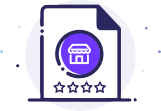How Do Business Term Loans Work?
Business term loans work as follows: Payments are due daily, weekly or monthly, depending on your terms, and are applied against the loan’s principal and interest.
Business term loans offer you higher funding amounts, longer repayment periods and lower interest rates than many financing alternatives. These characteristics make long term business loans a preferred choice for small business owners in need of capital.
When determining the best long term small business loan for you, consider the following factors:

Loan Term
Typically, business loan terms range from 1-5 years, giving you more time to pay off your debt. And with more time to repay your long term business loan, you can expect lower payments than you’d find with a shorter term.

Interest Rates
Business term loan rates will depend on many factors, including your credit score, revenue and time in business. But in general, they offer some of the most competitive rates available to small business owners.
Business term loans amortize. Interest accumulates on the remaining principal balance, and loan payments are interest-front-loaded, meaning a large part of your loan payments go toward interest at the beginning of your term. As time goes on, the interest portion of your loan payments decrease and more is applied to your loan principal.

Repayment
Business term loans are paid back in daily, weekly or monthly installments, depending on your terms. Variables such as the loan amount, term length, risk factors and business preference help determine this structure.

How to Qualify for a Business Term Loan
Qualifying for a business term loan involves a few different factors. The three that matter most are your time in business, your company’s annual revenue and your personal credit score. Because a business term loan will likely provide you with more favorable terms, there are typically stricter qualifying requirements.
Improve your chances of qualifying for a long term small business loan by:

Building Your Credit Score
Your personal credit score is an essential variable in qualifying for a business loan. Simply put, the higher it is, the easier it will be for you to qualify for the best business term loan rates and amounts you want.

Understanding Your Lender’s Requirements
Business term loan lenders will all require a specific threshold when it comes to time in business, annual revenue and credit score. According to the VantageScore credit scoring model developed by TransUnion, Experian and Equifax, a credit score of 600 is considered Poor.

Gathering Necessary Documents
In addition to your bank statements, your lender will ask you to provide a list of business and personal documents that reflect the health and stability of your business. These include, but aren’t limited to, your driver’s license, profit and loss statement and a voided business check.
Do You Qualify?
Based on previously approved borrowers, you’re likely to qualify if:
- You’ve been in business 1 or more years
- Your annual revenue is $200k or more
- You have a credit score of 600 or better
How Will You Use Your Business Term Loan?
You can use a business term loan for nearly any purpose. Looking to add machinery? Purchase inventory? Refinance existing business debt? Let’s look at a few common uses of long term small business loans and how they can fuel growth and increase ROI.

Business Expansion
Expanding your business isn’t exclusive to companies with physical locations. If you’re looking to add new employees to your team, introduce a new product, open another location or acquire a rival business, a business term loan can cover them all and more.

Debt Refinancing
Since business term loan rates are often lower than other options, it’s common to use them for debt refinancing. A lower interest rate could lessen your installment payments and total payback amount. This could provide short-term and long-term boosts to your business.

Equipment Financing

